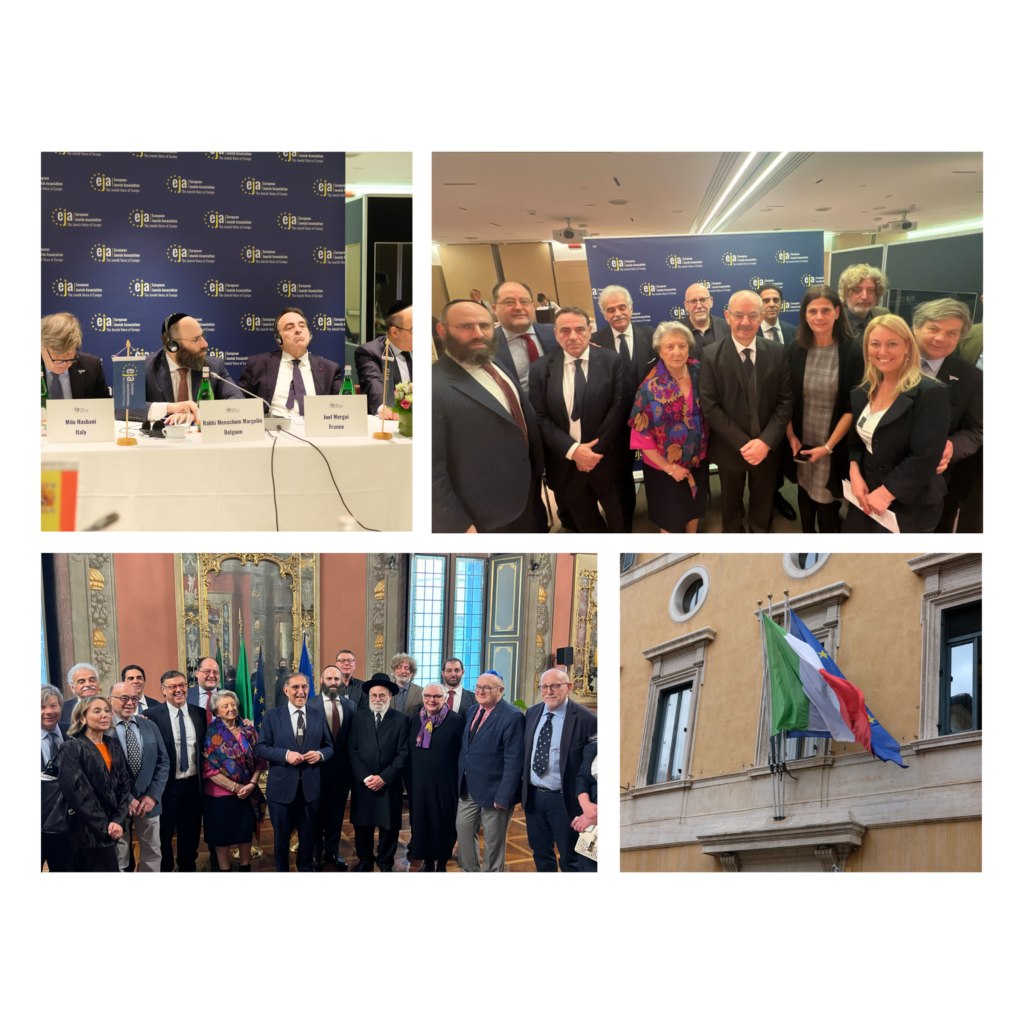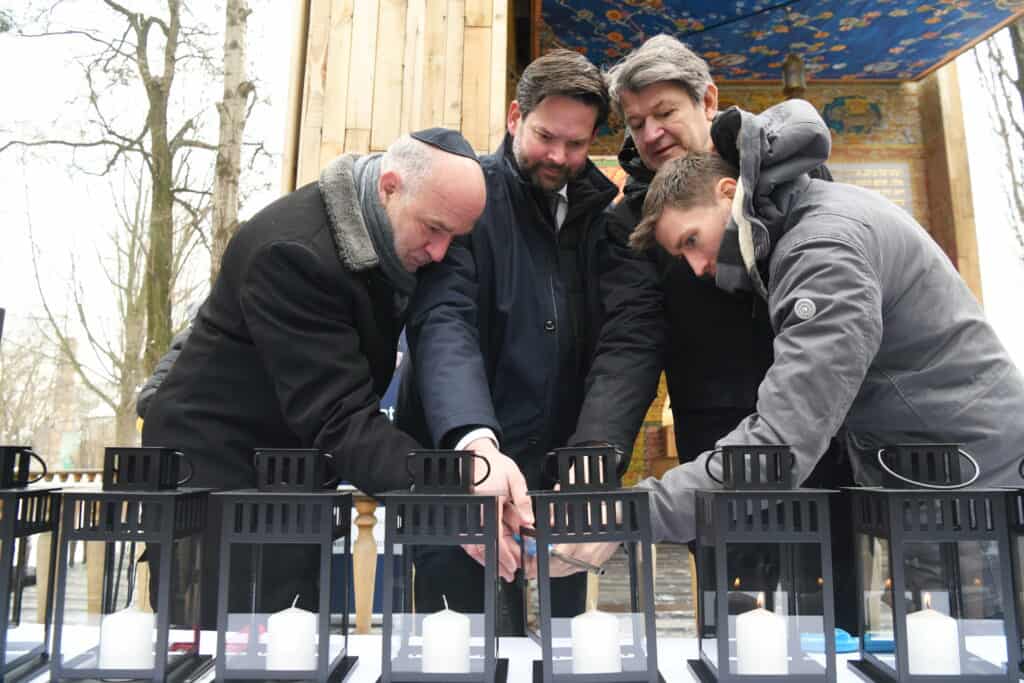On 19th September in Utrecht, Chief Rabbi Binyomin Jacobs, Senior EJA Board Member and Chairman of the EJA Committee for combating antisemitism, spoke at a solemn and important event, marking the ascendancy of the late Cardinal and Archbishop of Utrecht Johannes de Jong as a Righteous amongst the Nations by Yad Vashem for resisting the Nazis and saving hundreds of Jewish families and children.
Present at the event were all Dutch Bishops, the Israeli Ambassador to the Kingdom of the Netherlands, two representatives of the King.
In his speech to those assembled, Chief Rabbi Jacobs recalled one particularly brave and visible moment of Cardinal de Jong’s resistance, linking it to a recent Torah Portion urging the Israelites, before entering the Land of Israel to “walk in his (G-d’s) ways”
In his powerful remarks Chief Rabbi Jacobs said:
“Last Shabbat we read in all synagogues in the world the Parshah כי תבוא in which we read, among other things, in chapter 28 sentence 9: והלכת בדרכיו -and you shall walk in His Ways.
The great philosopher, lawyer and physician Maimonides counts these words as one of the 613 do’s and don’ts known to Judaism and he explains that man should try as much as possible to resemble Gd. As the Midrash, the narrative literature, explains: “As the Lord is called gracious, so also shalt thou be merciful. As the Eternal is called merciful, so also shalt thou be merciful. And as the Eternal is called loving, so also shalt thou be loving.”
It is known that Maimonides never counts general commandments, such as “Thou shalt keep My commandments” or “Thou shalt sanctify thyself” in the number of the 613 commandments and prohibitions that the Torah prescribes. Only specific commandments count. And so the question arises, why is “and ye shall walk in His ways” an exception made here and an apparently general and overarching commission elevated to a specific individual commandment?
It is quite conceivable that a man lives exactly and meticulously as He, the Eternal, desires of him. He never commits a violation. And yet he does not, as it were, rise higher on the spiritual ladder. He remains on the spiritual plane where he stood. Teach us the Torah here: והלכת בדרכיו – there must be movement. How does a person get his spiritual level moving? By not merely fulfilling His commandments, but by being constantly aware that His ways must be walked. Every commandment has its specific assignment, its own way of carrying out, but growing, rising higher and higher, being in motion is an assignment in itself.
I can imagine that in the 1940s-1945s situation, many dutifully obeyed G-d’s laws, kept all commandments, and committed no transgression. But was there any movement? Were they willing to move the moment movement was required? “Thou shalt walk in His ways.” It is not enough to keep His commandments. His ways must be walked, there must be progress, spiritual ascent, movement.
During the horrible war period, according to the historian Prof. Presser, five percent of the Dutch were on the move, but it was a movement in the wrong direction because that five percent of our Dutch population was collaborating with the enemy, the Nazis. Ninety percent sat motionless and so let it happen. And only five percent moved in the right direction, walking in G-d’s Ways, at the risk of their own lives. The bishops, led by Archbishop de Jong, were part of that five percent, because on Sunday, August 3, 1941, it was pronounced from all the pulpits that membership of National Socialist umbrella organizations was not only prohibited, but would also entail exclusion from the sacraments.
The following happened prior to that Sunday:
In the night from Saturday to Sunday, August 3, 1940, the telephone rang in the Archbishop’s Palace. The Gestapo wanted to speak to the Archbishop immediately. Archbishop de Jong has Dr. Geerdinck announce that the men can come in half an hour. De Jong dresses in his official attire and the chandeliers are burning in the large room for guests.
When the bell rings at exactly four o’clock, Dr. Geerdinck opens, asks Himmler’s men to remove their coats and climbs the state staircase in front of them. Arriving at the door, he asks their names, knocks and leads the men inside. The Archbishop stands behind the table in his official garb and is silent. dr. Geerdinck announces: “Excellence. Obersturmführer Matzker and his adjutant”. De Jong bends down and remains silent. Geerdinck says: “setzen Sie sich”. Everyone sits down and everyone is silent.
Finally, the Obersturmführer takes out a narrow roll of paper and begins to read that the proclamation to ban membership of National Socialist umbrella organizations must not take place tomorrow morning. The Archbishop indicates that he has understood the message, whereupon his visitor says: “It is now four o’clock. All presbyteries can be reached by telephone. The proclamation in the church can be cancelled without difficulty.” The Archbishop mumbles that it is clear to him.
Then there is silence again, for a long time. Finally, Geerdinck says, “Gentlemen, have you fulfilled your assignment with this?”. They mumble yes, whereupon Geerdinck stands up and the visitors follow his example. A farewell is said, silently and without greeting.
The next Sunday morning, of course, the announcement went through everywhere. The words non possumus non loqui sound – “We cannot be silent”.
De Jong refused to simply continue to serve the Eternal as a faithful Catholic and to remain silent. He knew that especially as a church leader, movement, action was expected of him.
I regret that he could not be awarded the Yad Vashem award during his lifetime, but I am grateful that, thanks in part to the efforts of my good friend Dr. Hans Themans, we are finally gathered here today to show the world who and what de Jong used to be.
His Eminence Dr. Johannes Cardinal de Jong no longer needs the award, because he is rewarded daily for his willingness to risk his own life and to keep moving in the dark 1940s-45s, when 90% of our Dutch society motionless saw it and let it happen.
But this special meeting is of great importance to us, because alertness was, is and remains required. What happened then can happen again today and tomorrow. The war ended in our country on May 5, 1945, but anti-Semitism, today under the pseudonym anti-Zionism, has remained.”
















